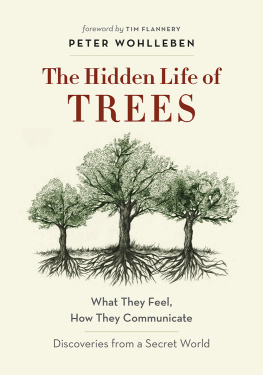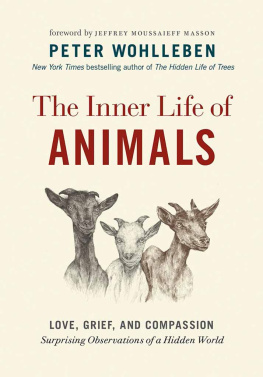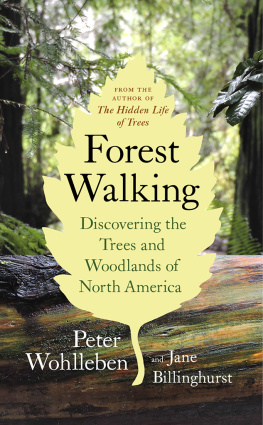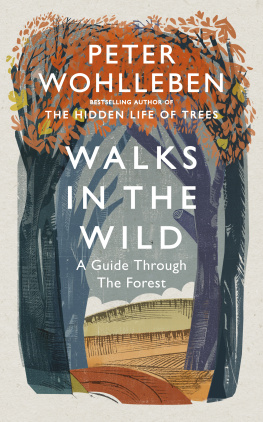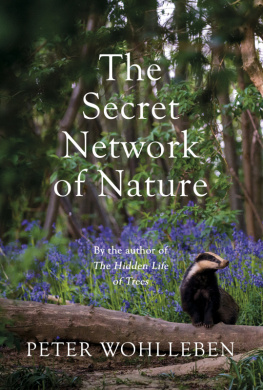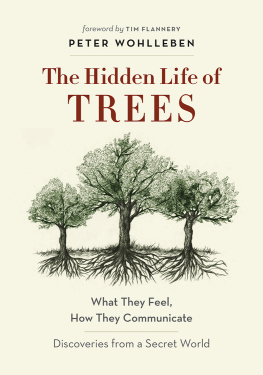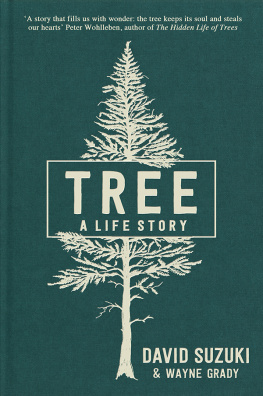Peter Wohlleben - The Heartbeat of Trees
Here you can read online Peter Wohlleben - The Heartbeat of Trees full text of the book (entire story) in english for free. Download pdf and epub, get meaning, cover and reviews about this ebook. year: 2021, publisher: Lightning Source Inc. (Tier 2), genre: Romance novel. Description of the work, (preface) as well as reviews are available. Best literature library LitArk.com created for fans of good reading and offers a wide selection of genres:
Romance novel
Science fiction
Adventure
Detective
Science
History
Home and family
Prose
Art
Politics
Computer
Non-fiction
Religion
Business
Children
Humor
Choose a favorite category and find really read worthwhile books. Enjoy immersion in the world of imagination, feel the emotions of the characters or learn something new for yourself, make an fascinating discovery.

- Book:The Heartbeat of Trees
- Author:
- Publisher:Lightning Source Inc. (Tier 2)
- Genre:
- Year:2021
- Rating:3 / 5
- Favourites:Add to favourites
- Your mark:
- 60
- 1
- 2
- 3
- 4
- 5
The Heartbeat of Trees: summary, description and annotation
We offer to read an annotation, description, summary or preface (depends on what the author of the book "The Heartbeat of Trees" wrote himself). If you haven't found the necessary information about the book — write in the comments, we will try to find it.
The Heartbeat of Trees — read online for free the complete book (whole text) full work
Below is the text of the book, divided by pages. System saving the place of the last page read, allows you to conveniently read the book "The Heartbeat of Trees" online for free, without having to search again every time where you left off. Put a bookmark, and you can go to the page where you finished reading at any time.
Font size:
Interval:
Bookmark:

OTHER BOOKS BY PETER WOHLLEBEN
The Hidden Life of Trees:
What They Feel, How They Communicate
Discoveries From a Secret World
The Inner Life of Animals:
Love, Grief, and CompassionSurprising
Observations of a Hidden World
The Secret Wisdom of Nature:
Trees, Animals, and the Extraordinary
Balance of All Living Things
Stories From Science and Observation
The Hidden Life of Trees:
The Illustrated Edition

First published in English by Greystone Books in 2021
Originally published in German as Das geheime Band zwischen Mensch und Natur: Erstaunliche Erkenntnisse ber die 7 Sinne des Menschen, den Herzschlag der Bume und die Frage, ob Pflanzen ein Bewusstsein haben by Peter Wohlleben 2019 Ludwig Verlag, part of the Random House GmbH publishing group, Mnchen
English translation copyright 2021 by Jane Billinghurst
21 22 23 24 25 5 4 3 2 1
All rights reserved. No part of this book may be reproduced, stored in a retrieval system or transmitted, in any form or by any means, without the prior written consent of the publisher or a license from The Canadian Copyright Licensing Agency (Access Copyright). For a copyright license, visit accesscopyright.ca or call toll free to 1-800-893-5777.
Greystone Books Ltd.
greystonebooks.com
Cataloguing data available from Library and Archives Canada
ISBN 978-1-77164-689-5 (cloth)
ISBN 978-1-77164-690-1 (epub)
Editing by Jane Billinghurst
Copyediting by Tracy Bordian
Proofreading by Alison Strobel
Indexing by Stephen Ullstrom
Jacket design by Nayeli Jimenez and Jessica Sullivan
Text design by Nayeli Jimenez
Jacket photograph by Abstract Aerial Art/Getty Images
Author photograph by Miriam Wohlleben
Endsheet photograph by Anna Om/Shutterstock
Greystone Books gratefully acknowledges the Musqueam, Squamish, and Tsleil-Waututh peoples on whose land our office is located.
Greystone Books thanks the Canada Council for the Arts, the British Columbia Arts Council, the Province of British Columbia through the Book Publishing Tax Credit, and the Government of Canada for supporting our publishing activities.

I N RECENT YEARS, all over the world, there has been renewed interest in ways to immerse ourselves in nature. Forest bathing, for instance, has emerged as a therapeutic practicein Japan, you can even get a prescription for it. At the same time, forests continue to be clear-cut with no thought given to the consequences. This reckless removal of trees fuels climate change. Faced with these contradictions, it can be hard for us to reclaim our place in the natural world. None of us deliberately sets out to destroy the environment, and yet we are all caught up in our consumer-oriented lives.
Assigning blame or giving in to despair, however, are far from helpful. Pointing an accusing finger at an apocalypse just waiting to happen, at a tipping point beyond which there appears to be no return to a stable climate, conjures up images of medieval inquisitions and couldnt be further from the positive encouragement we so desperately need right now.
And so, I invite you to join me in the forest instead, where we will discover that the ancient tie that binds humans and nature exists to this day and is as strong as ever.
Dont worry, our connection with nature is not so diminished that our only hope of long-term survival lies with modern technology. On this journey into the forest, youll be amazed at how well your senses function. You are, for example, better at detecting some smells than dogs are. Well discover that electrical activity in trees gives spiders goosebumps and explore a well-stocked natural pharmacy available not only to animals but also to you. And while youre exploring, youll be surrounded by a cocktail of chemical communication that will strengthen your circulatory and immune systems.
Many people no longer notice these wonders. Not because our senses have atrophiedthey all still work just fine, as the many different examples in this book will show youbut rather because of a strange philosophical and scientific worldview that erects unnecessary barriers between us and our fellow life-forms. Over here we have people, and over there we have nature. Over here reason runs the show, while over there a sophisticated, mindless, and apparently almost mechanical system runs its course.
The realization that we are still a part of this wonderful system and that we function according to the same rules as all other species is, thank goodness, gradually making headway. And its only when it comes to the fore that conservation can be effectivethat is to say, when we realize that what we are conserving is not just other forms of life but, first and foremost, ourselves.
M ORE AND MORE people are taking delight in nature and not only want to see the forest but also to experience it as intensely as they canand I am one of them. We often envy animals for the immediate, clear feedback their senses give them, but how aware are we of our own senses? After living for centuries in a human-oriented world that robs us of the daily necessity of keeping a wary eye on nature, what skills do we still possess?
If we are to believe the multitude of reports that compare the amazing skills of animals with our own, as a species we dont have much to offer other than brain power. In matters of the senses, we fall short when measured against almost all of our fellow creatures. Sometimes we even seem to relish our role as evolutionary losers. And so, the bond between people and nature appears to be ruptured beyond repair, and all there is left for us to do is to peer enviously at the amazing abilities animals possess.
We couldnt be more wrong. We are completely capable of engaging effectively with the world in which we live. It wasnt so long ago that our ancestors had to fight their way through forests, registering the presence of every possible danger or potential prey quickly enough to act. And because the blueprint for making humans has not changed since then, we can console ourselves with the thought that all our senses are still intact. The only thing missing is a bit of practiceand here we can catch up.
Lets first consider vision and ask a seemingly simple question: Why do we see trees in color?
We know we feel relaxed when we look at green trees. A shady green view even improves our health. But why do we see the color green in the first place? After all, this is not a skill most other mammals share with us. Their world is restricted to a narrow range of colors. Take the highly intelligent dolphin. Like many marine mammals, dolphins see the world in black and white, because their retinas contain just one type of cone (cones are cells that make it possible to see color). To distinguish between two colors, you need at least two different types of cones. Paradoxically, the one cone dolphins and other similar animals have is for the color green. This one cone allows them to distinguish between various levels of brightness, but that is all. Dolphins cant even process blue light, which not only colors the surface of the ocean but also reaches way down into the depths.
Font size:
Interval:
Bookmark:
Similar books «The Heartbeat of Trees»
Look at similar books to The Heartbeat of Trees. We have selected literature similar in name and meaning in the hope of providing readers with more options to find new, interesting, not yet read works.
Discussion, reviews of the book The Heartbeat of Trees and just readers' own opinions. Leave your comments, write what you think about the work, its meaning or the main characters. Specify what exactly you liked and what you didn't like, and why you think so.

